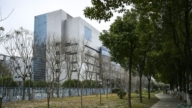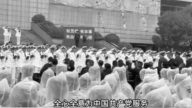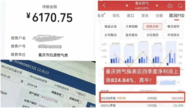【新唐人2011年6月1日讯】在最近举办的“2011年陆家嘴金融论坛”上,大陆央行行长周小川表示,中国的高储蓄率容易刺激资产泡沫的产生。他的这个说法,其他专家是怎么看的呢?中国的高储蓄率是否真的会导致资产泡沫?请看报导。
中国一直是一个高储蓄率国家。从2009年的资料显示,中国的储蓄率高达46%。而今年4月末,人民币存款余额达到75.62万亿元。
储蓄率是指个人或家庭可支配的收入总额中,储蓄所占的百分比。中国为什么储蓄率如此之高呢?
南卡罗莱纳州大学教授谢田认为,这其中有传统文化的因素,但更主要的是,在中共统治下,社会保障体系不完善造成的。
谢田:“中国老百姓最害怕的是什么呢?一个是养老金、退休金﹔一个是医疗的费用﹔一个上学的费用。中国人民穷怕了,苦怕了,对未来又没有依托感,对政府没有信任,所以就造成中国大陆人的储蓄率非常之高。”
据统计,中国有8亿农民。2009年,中共推出“新农村养老保险”政策。中国社科院《2011年法治蓝皮书》提出,“新农保”的费率水准和国家标准很低,参保农民每月仅有养老金99元,根本难以保障农民的基本生活。
今年两会期间,据官方统计资料显示,有65.5%的受访者认为中国的“医疗费用过高”。此外,中国大学收费高已经成为民众的一个沉重负担,但据《时代商报》一项调查显示,沈阳的七成幼儿园收费高于大学。
中国的高储蓄率是否导致资产泡沫的产生呢?经济专家、简天伦博士认为,这个说法并不正确。他认为,造成中国房地产泡沫的原因,与中国的贫富悬殊社会现象有很大关系。
今年4月,招商银行和贝恩管理顾问公司联合发布了《2011中国私人财富报告》。报告显示, 2010年,可投资资产一千万人民币以上的中国高净值人士数量达50万人,人均持有可投资资产约3000万人民币,共持有可投资资产15万亿人民币。这部分人仅占中国人口的万分之四,而他们所持有的资产相当于中国个人投资总资产的25%。
简天伦:“他们在2009年、2010、2011年,他们占全国个人可投资资产的比率逐年上升,由23%到24%到25%。所以,由这么少的人口,占有这么多的可投资资产,这个地方,我觉得是中国房地产泡沫和其他资产泡沫最大的原因之一。”
按照中国高净值人群地域分布来看,北京、上海、浙江、江苏、广东都超过了3 万人。而这5个省市的房价在中国也是名列前茅。
最近两年,中国股票市场低迷,关于“股票市场要崩盘”的消息不断传来。谢田表示,中国股票市场也是中国权贵捞钱的场所。
英国《金融时报》专栏作家叶檀,形容中国的证券市场是一台吸血机器。她在她的文章中提到,根据WIND资讯不完全统计,2010年上市的 340多支新股中,平均每支新股上市就有2.4位亿万富翁产生。与此形成鲜明对比的是,有调查显示,在股市中赚钱的股民不足20%,近70%的股民亏钱。
但是,中国老百姓为什么还要把钱投入股票市场呢?
谢田:“民间、外资企业、其他投资银行估计,中国的通货膨胀至少在10%以上或15%。在这么高的通货膨胀之下,老百姓即使想储蓄,他也不敢储蓄,没办法储蓄。所以很多人不得不把钱投入股市,而投入股市的钱,这些年也慢慢看清,实际上也是被大富、被操纵金融市场的中共特权阶层给榨干了。”
谢田指出,不管是房地产泡沫还是股票市场的泡沫,始作俑者都是中共的权贵集团,而与中国高储蓄根本没有关系。
新唐人记者李静,萧宇 采访报导
Asset Bubble Due To High Savings?
Central Bank of China’ president, Zhou Xiaochuan,
said in the Lujiazui Financial Forum of 2011 that
China’s high saving rate might spawn asset bubbles.
Is this the case? What do other experts think?
Here is NTD’s detailed report on the issue.
China is long known as a high saving rate country.
2009 reports show the saving rates to be up to 46%.
RMB outstanding deposit is 75.6 trillion by Apr.11.
Saving rate represents the percentage of savings
in individual’s total disposable income.
Why does China have such a high saving rate?
Xie Tian, professor at University of North Carolina,
said that Chinese tradition is one of the reasons,
but mostly this is due to the insecure social system
under the rule of Chinese Communist Party (CCP).
Xie Tian: “Chinese people generally worry
about 3 things: retirement, health and education.
They have been kept poor for a long time,
with no security for the future, nor from the CCP,
and that triggers the huge saving rate record.”
There are reportedly 0.8 billion farmers in China.
In 2009, CCP released New Village Pension Scheme.
According to the Law Blue Book of 2011, published
by the Chinese Academy of Social Sciences.
The standard rate of village pension in the scheme
was made notably low, with just RMB99 per month,
far from enough for a normal life.
During the two CCP congresses this year,
it was reported that 65.5% of interviewees thought
the medical expenses are too high.
Chinese high education charges are another burden.
Will China’s high saving rate spawn asset bubbles?
Economist Jian Tianlun thinks otherwise.
The real reason for China’s property bubbles
is the remarkable wealth gap in China, believes Jian.
In April, China Merchants Bank and Bain company
jointly issued the China’s Individual wealth of 2011.
It showed that by 2010, China had 500,000 HNWI
(High Net Worth Individuals) able to invest
RMB10+ million and each holding RMB30 million
investable, equating to a total of RMB15 trillion.
This group accounts 0.04% of China’s population,
but it enjoys 25% of China’s investment assets.
Jian Tianlun: “They enjoy an escalating rate
in national individual investment asset, with 23%,
24% and 25% in 2009, 2010 and 2011 respectively.
On account of that, I suggest that this is the problem
truly causing the current Chinese property bubbles.”
As to the Chinese HNWI distribution, more than
30,000 of them are evident in cities like Beijing,
Shanghai, Zhejiang, Jiangsu and Guangdong,
where the house prices are highest in China.
China’s stock market was in downturn the last 2 years.
Rumors about collapse of stock market are in the air.
Xie Tian said that the stock market was a place
where those bigwigs lined their pockets.
Columnist in Financial Times, Ye Tan regards
China’s stock market as a sucking machine.
According to WIND in 2010, of the 340+ new stocks
listed, the average IPO generated 2.4 billionaires.
In contrast, less than 20% of the Chinese investors
made a profit, with more than 70% being at a loss.
Why do Chinese investors keep investing in it?
Xie Tian: “According to both overseas investors
and other investment institutions,
China has 10-15% inflation rate. With such a rate,
Chinese people resort to savings by all means.
They then come to the stock market and invest,
only to gradually realize that their investments
end up in the pockets of CCP’s privileged clans.”
Xie Tian said that whether it is the property bubbles
or stock market, the real problem had nothing to do
with the high savings rate, but with the CCP clans.
NTD reporters Li Jing and Xiao Yu

























